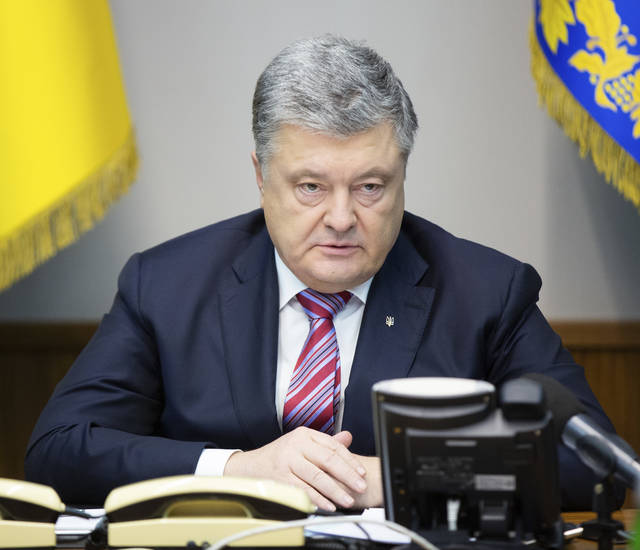KIEV, Ukraine — Ukrainian officials on Friday upped the ante in their nation’s growing confrontation with Russia, announcing a travel ban for most Russian men and searching the home of an influential cleric of the Russian Orthodox Church.
The long-simmering conflict bubbled over Sunday when Russian border guards rammed into and opened fire on three Ukrainian boats near the Crimean Peninsula, which Moscow annexed in 2014. The vessels were trying to pass through the Kerch Strait on their way to the Sea of Azov, where Ukraine has two major ports. The Russians then seized the ships and have detained their 24 crew members.
In response, the Ukrainian parliament on Monday passed the president’s motion to impose martial law in all border areas for 30 days.
Russia claims the boats were violating its border, while Ukraine says they were in international waters. The Kerch Strait is sensitive area for Russia, since it just built a long bridge from the mainland to occupied Crimea there.
There’s been growing hostility between Ukraine and Russia since Moscow’s annexation of Crimea from Ukraine in 2014, a move that greatly expanded Russia’s Black Sea coastline. Russia has also supported separatists in Ukraine’s east with clandestine dispatches of troops and weapons. Fighting there has killed at least 10,000 people since 2014 but eased somewhat after a 2015 truce.
Petro Tsygykal, chief of the Ukrainian Border Guard Service, announced Friday at a security meeting that all Russian males between 16 and 60 will be barred from traveling to the country while martial law is in place.
Ukrainian President Petro Poroshenko told the meeting the measures were taken “to prevent the Russian Federation from forming private armies” on Ukrainian soil.
The announcement follows Thursday’s decision by U.S. President Donald Trump to scrap his much-anticipated meeting with Russian leader Vladimir Putin at the G-20 summit in Buenos Aires. Trump said it isn’t appropriate for him to meet with Putin since Russia hasn’t released the Ukrainian seamen.
A Crimea court this week ruled that the Ukrainian seamen will be kept behind bars for two months pending Russia’s investigation into the clash. They have been taken from Crimea to Moscow.
Kogershyn Sagiyeva, a member of the Moscow oversight council, told the television station Dozhd that 21 Ukrainian seamen are already at the Moscow Lefortovo jail while three others are in a hospital in another jail. She said she met with some of them and they appeared to be in good shape.
Meanwhile, another serious confrontation is heating up between Ukraine and Russia over the Orthodox Church.
Ukraine’s intelligence agency announced it was investigating a senior cleric of the Russian Orthodox Church and its agents on Friday searched the home of Father Pavlo, who leads the Pechersk Monastery in Kiev. The agency said he was suspected of “inciting hatred,” accusations that he vehemently denied.
The Ukrainian church has been part of the Russian Orthodox Church for centuries but is moving close to forming an independent church, a momentous step that would split the world’s largest Eastern Orthodox denomination.
Both the Russian Orthodox Church and Russian authorities are strongly against the move and have warned Ukraine not to do it, fearing sectarian violence.
There are currently three Orthodox communities in Ukraine, including two breakaway churches. The Pechersk Monastery, the spiritual center of Ukraine, is under the jurisdiction of the Russian Orthodox Church.
Ukrainian authorities have sought to portray the Russian Orthodox clerics in Ukraine as supporting Russian-backed separatists in eastern Ukraine.
Ukraine’s president announced Thursday night that the Constantinople patriarchy has approved a decree granting the Ukrainian Orthodox Church independence from the Russian Orthodox Church, a major boost to the president’s approval ratings.
Father Pavlo, leader of Kiev’s oldest and largest monastery, spoke to reporters Friday, saying the raid was carried out on personal orders by Poroshenko to put pressure on his church.
Pavlo said, however, he will not recognize a new Ukrainian church.
“I’m feeling the pressure from all sides. But I would like to assure you that I am part of the holy church and I do not recognize any other church,” he said, speaking by the ornate gilded altar at one of the monastery’s cathedrals.
——
Natasha Vasilyeva reported from Moscow.


